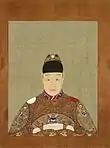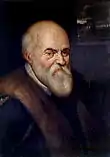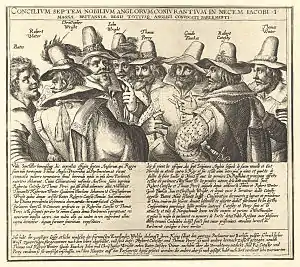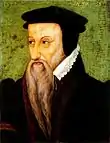1605
1605 (MDCV) was a common year starting on Saturday of the Gregorian calendar and a common year starting on Tuesday of the Julian calendar, the 1605th year of the Common Era (CE) and Anno Domini (AD) designations, the 605th year of the 2nd millennium, the 5th year of the 17th century, and the 6th year of the 1600s decade. As of the start of 1605, the Gregorian calendar was 10 days ahead of the Julian calendar, which remained in localized use until 1923.

The Red Hall, Bourne, England, dating from 1605[1]
| Millennium: | 2nd millennium |
|---|---|
| Centuries: | |
| Decades: | |
| Years: |
| 1605 by topic |
|---|
| Arts and science |
|
| Leaders |
|
| Birth and death categories |
| Births – Deaths |
| Establishments and disestablishments categories |
| Establishments – Disestablishments |
| Works category |
|
| Gregorian calendar | 1605 MDCV |
| Ab urbe condita | 2358 |
| Armenian calendar | 1054 ԹՎ ՌԾԴ |
| Assyrian calendar | 6355 |
| Balinese saka calendar | 1526–1527 |
| Bengali calendar | 1012 |
| Berber calendar | 2555 |
| English Regnal year | 2 Ja. 1 – 3 Ja. 1 |
| Buddhist calendar | 2149 |
| Burmese calendar | 967 |
| Byzantine calendar | 7113–7114 |
| Chinese calendar | 甲辰年 (Wood Dragon) 4301 or 4241 — to — 乙巳年 (Wood Snake) 4302 or 4242 |
| Coptic calendar | 1321–1322 |
| Discordian calendar | 2771 |
| Ethiopian calendar | 1597–1598 |
| Hebrew calendar | 5365–5366 |
| Hindu calendars | |
| - Vikram Samvat | 1661–1662 |
| - Shaka Samvat | 1526–1527 |
| - Kali Yuga | 4705–4706 |
| Holocene calendar | 11605 |
| Igbo calendar | 605–606 |
| Iranian calendar | 983–984 |
| Islamic calendar | 1013–1014 |
| Japanese calendar | Keichō 10 (慶長10年) |
| Javanese calendar | 1525–1526 |
| Julian calendar | Gregorian minus 10 days |
| Korean calendar | 3938 |
| Minguo calendar | 307 before ROC 民前307年 |
| Nanakshahi calendar | 137 |
| Thai solar calendar | 2147–2148 |
| Tibetan calendar | 阳木龙年 (male Wood-Dragon) 1731 or 1350 or 578 — to — 阴木蛇年 (female Wood-Snake) 1732 or 1351 or 579 |
Events
January–June
- January 16 – The first part of Miguel de Cervantes' satire on the theme of chivalry, Don Quixote (El ingenioso hidalgo don Quixote de la Mancha, "The Ingenious Hidalgo Don Quixote of La Mancha"), is published in Madrid. One of the first significant novels in the western literary tradition, it becomes a global bestseller almost at once.[2]
- March 11 – A proclamation declares all people of Ireland to be the direct subjects of the British Crown and not of any local lord or chief.[3]
- April 1 – Pope Leo XI succeeds Pope Clement VIII, to become the 232nd pope, as a result of the heated Papal conclave of March 1605.[4]
- April 8 – The city of Oulu (Swedish: Uleåborg) was founded by King Charles IX of Sweden.[5]
- April 13 – Tsar Boris Godunov dies; Feodor II accedes to the Russian throne.
- April 16 – In England, John Winthrop, later governor of the future Massachusetts Bay Colony, marries his first wife (of 4), Mary Forth, daughter of John Forth, of Great Stambridge, Essex.
- May 16 – Pope Paul V succeeds Pope Leo XI as the 233rd pope, making this the last Year of Three Popes until 1978. He is elected as a compromise candidate after the Papal conclave of May 1605 leads to physical assault.[6]
- June 1 – Russian troops in Moscow imprison Feodor II and his mother, later executing them.
- June 20 – Pretender Dmitriy and his supporters, including troops of the Polish–Lithuanian Commonwealth, march to Moscow.[7]
July–December
- July 4 – A proclamation commands all Roman Catholic seminary priests and Jesuits to leave Ireland by December 10 and directs the laity to attend Church of Ireland services.[3]
- July 13 - A 7.5 earthquake strikes China's Hainan Province causing widespread damage and thousands of deaths.
- July 21 – Pretender Dmitriy is officially crowned Tsar Dimitriy Ioannovich of Russia in Moscow by Patriarch Ignatius.
- September 27 – Swedish armies are decisively defeated by Polish–Lithuanian Commonwealth cavalry in the Battle of Kircholm.
- October
- First publication of Relation aller Fürnemmen und gedenckwürdigen Historien by Johann Carolus in Strasbourg (Holy Roman Empire), generally regarded as the world's first newspaper.[8] De Nieuwe Tijdinghen, a Dutch proto-newspaper, is also published this year.
- Francis Bacon's Of the Proficience and Advancement of Learning, Divine and Human is published in London.
- October 27 – The 3rd Mughal Emperor, Akbar "the Great" dies of dysentery at Fatehpur Sikri in India.
- October 28 – Eighty Years' War: Spanish troops under Ambrogio Spinola, 1st Marquess of Los Balbases, Captain-General of the Army of Flanders (newly appointed a Knight of the Order of the Golden Fleece), occupy Wachtendonk after a 20-day siege.
- November 3 – The 4th Mughal Emperor Jahangir begins his 22-year reign over the Mughal Empire.
- November 5 – Gunpowder Plot: A plot to blow up the English Houses of Parliament is foiled when, following a tip-off, Sir Thomas Knyvet, a justice of the peace, finds Catholic plotter Guy Fawkes in a cellar below the Parliament building and orders a search of the area. 36 barrels of gunpowder are found and Fawkes is arrested for trying to kill King James I of England and the members who are scheduled to sit together in Parliament the next day.[9]
Date unknown
- Tokugawa Ieyasu abdicates as shōgun of Japan, becoming Ogosho (retired shōgun). His son Tokugawa Hidetada succeeds him to the office.
- Habitation at Port-Royal established by France under Pierre Dugua, Sieur de Mons, the first European colonization of Nova Scotia in North America (at this time part of Acadia); the Gregorian calendar is adopted.
- Crew of the Olive become the first English visitors to Barbados.
- Refugee French Huguenot merchants begin to settle in Dublin and Waterford.[10]
- The Priory of St. Gregory's is founded at Douai, Flanders, at this time in the Spanish Netherlands, by its first prior, John Roberts, and other exiles, thus becoming the first English Benedictine house to renew conventual life after the English Reformation. More than two centuries later the community will establish Downside Abbey back in England.
- The Irish College in Paris is co-founded by John Lee, an Irish priest, and John de l'Escalopier, President of the Parlement.
- Central Mexico's Amerindian population reaches one million.
Births

Shahryar

Federico Ubaldo della Rovere, Duke of Urbino

Simon Dach

Tianqi Emperor
January–March
- January 16 – Shahryar, fifth and youngest son of the Mughal Emperor Jahangir (d. 1628)
- January 17 – Anthony Irby, English politician (d. 1682)
- February 1 – Isaac Aboab da Fonseca, Portuguese Sephardic rabbi (d. 1693)
- February 17 – Luca Ferrari, Italian painter (d. 1654)
- February 18
- February 20 – Sir John Lowther, 1st Baronet, of Lowther, English politician (d. 1675)
- March 1 – James Wriothesley, Lord Wriothesley, English politician (d. 1624)
- March 2 – René Menard, Canadian explorer (d. 1661)
- March 3 – George Horner, English politician (d. 1677)
- March 14 – Francis Davies, Welsh bishop (d. 1675)[11]
- March 17 – George II, Landgrave of Hesse-Darmstadt (1626–1661) (d. 1661)
April–June
- April 8
- King Philip IV of Spain (d. 1665)[12]
- Mary Stuart, English-Scottish princess (d. 1607)
- April 18 – Giacomo Carissimi, Italian composer (d. 1674)
- April 19 – Orazio Benevoli, Italian composer (d. 1672)
- April 30 – Peder Winstrup, Bishop of Lund (d. 1679)
- May 7 – Patriarch Nikon of Moscow, Patriarch of the Russian Orthodox Church (d. 1681)
- May 16 – Federico Ubaldo della Rovere, Duke of Urbino, Italian noble (d. 1623)
- May 29 – Hendrick van Anthonissen, Dutch painter (d. 1656)
- June 15 – Thomas Randolph, English poet and dramatist (d. 1635)
- June 22 – Andrea Bolgi, Italian sculptor (d. 1656)
July–September
- July 6 – Ulrich II, Count of East Frisia, ruler of East Frisia in the later years of the Thirty Years' War (d. 1648)
- July 25 – Theodore Haak, German scholar (d. 1690)
- July 29 – Simon Dach, Prussian German lyrical poet and writer of hymns (d. 1659)
- August 6
- August 8 – Cecil Calvert, 2nd Baron Baltimore, first Proprietor and Proprietary Governor of the Province of Maryland (d. 1675)
- August 18 – Henry Hammond, English churchman (d. 1660)
- August 25 – Philipp Moritz, Count of Hanau-Münzenberg, German noble (d. 1638)
- August 30 – Felice Ficherelli, Italian painter (d. 1660)
- August 31 – Nicolas Talon, French Jesuit (d. 1691)
- September 1 – Michele Mazzarino, Italian Catholic cardinal (d. 1648)
- September 8 – Cornelis Jan Witsen, Mayor of Amsterdam (d. 1669)
- September 12 – William Dugdale, English antiquary and herald (d. 1686)
- September 14 – Brynjólfur Sveinsson, Icelandic bishop and scholar (d. 1675)
- September 17 – Francesco Sacrati, Italian composer (d. 1650)
- September 24 – Antoine Godeau, French bishop and poet (d. 1672)
- September 28 – Ismaël Bullialdus, French astronomer (d. 1694)
October–December
- October 15 – Marie de Bourbon, Duchess of Montpensier, French princess (d. 1627)
- October 16 – Charles Coypeau d'Assoucy, French writer and composer (d. 1677)
- October 19 – Sir Thomas Browne, English physician and philosopher (d. 1682)
- October 22 – Frédéric Maurice de La Tour d'Auvergne, prince of the independent principality of Sedan (d. 1652)
- November 3 – John Henderson, 5th of Fordell, Scottish noble (d. 1650)
- November 4 – William Habington, English poet (d. 1654)
- November 5 – Thomas Shepard, American Puritan minister and a significant figure in early colonial New England (d. 1649)
- December 1 – Roger Hill, English politician (d. 1667)
- December 8 – François Vavasseur, French writer (d. 1681)
- December 16 – Jerome Weston, 2nd Earl of Portland, English diplomat and landowner (d. 1663)
- December 23 – Tianqi Emperor, Ming emperor of China (d. 1627)
- December 25 – Francis Godolphin, English politician (d. 1667)
Date unknown
- William Berkeley, English governor of Virginia (d. 1677)
- Adriaen Brouwer, Flemish painter (d. 1638)
- Aleksander Dominik Kazanowski, Polish nobleman (d. 1648)
- Alexandra Mavrokordatou, Greek intellectual and salonist (d. 1684)
- Afanasy Ordin-Nashchokin, Russian statesman (d. 1680)
- Jean-Baptiste Tavernier, French traveller and pioneer of trade with India (d. 1689)
- Constantia Zierenberg, German-Polish singer (d. 1653)
- Thomas Hastings, American politician (d. 1685)
- Johann Rudolf Stadler, Swiss clock-maker (d. 16 October 1637)[13]
- Ayşe Sultan and/or Gevherhan Sultan, Ottoman princesses, daughters of Ahmed I
Deaths

Ulisse Aldrovandi
January–March
- January 16 – Eitel Friedrich IV, Count of Hohenzollern (b. 1545)
- February 5 – Edward Stafford, English diplomat (b. 1552)
- February 15 – Maria of Hanau-Münzenberg, German noblewoman (b. 1562)
- February 19 – Orazio Vecchi, Italian composer (b. 1550)
- February 24 – Girolamo Simoncelli, Italian Catholic cardinal (b. 1522)
- February 26 – George III, Count of Erbach-Breuberg (1564–1605) (b. 1548)
- March 5 – Pope Clement VIII (b. 1536)[14]
- March 12 – King Alexander II of Kakheti (b. 1527)
- March 17 – Pieter Bast, Dutch cartographer, engraver and draftsman (b. 1550)
April–June
- April 5 – Adam Loftus, English Catholic archbishop (b. c. 1533)
- April 6 – John Stow, English historian and antiquarian (b. 1525)
- April 10 – Albrecht VII, Count of Schwarzburg-Rudolstadt (b. 1537)
- April 13 – Boris Godunov, Tsar of Russia (b. 1551)[15]
- April 14 – Francis Cherry, English diplomat (b. 1552)
- April 25 – Naresuan, Siamese King of Ayutthaya kingdom (b. c. 1555)
- April 27 – Pope Leo XI (b. 1535)[16]
- May 4 – Ulisse Aldrovandi, Italian naturalist (b. 1522)
- May 10 – Casimir VI, Duke of Pomerania, Lutheran Administrator of Cammin Prince-Bishopric (b. 1557)
- June 3 – Jan Zamoyski, Polish nobleman (b. 1542)[17]
- June 9 – John Louis II, Count of Nassau-Wiesbaden-Idstein (1596–1605) (b. 1596)
- June 20 – Tsar Feodor II of Russia (b. 1589)[7]
July–September
- July 2 – Louis I, Count of Sayn-Wittgenstein (1588–1605) (b. 1532)
- July 18 – Johann II, Duke of Saxe-Weimar, German duke (b. 1570)
- July 26 – Rev. Fr. Miguel de Benavides, O.P., Spanish clergyman and sinologist (b. 1552)
- August 2 – Richard Leveson, English admiral (b. c. 1570)
- August 4 – Charles I, Duke of Elbeuf, French duke and nobleman (b. 1556)
- September 9 – Heinrich Khunrath, German physician (b. 1560)
- September 11 – Sir Thomas Tresham, English politician (b. 1550)
- September 14 – Jan Tarnowski, Archbishop of Kraków (b. 1550)
- September 19 – Edward Lewknor, English politician (b. 1542)
- September 23 – Pontus de Tyard, French poet (b. c. 1521)
- September 24 – Manuel Mendes, Portuguese composer (b. 1547)
October–December
- October 13 – Theodore Beza, French theologian (b. 1519)
- October 18 – Beate Clausdatter Bille, Danish noblewoman (b. 1526)
- October 22 – King Constantine I of Kakheti (b. 1567)
- October 27 – Akbar The Great, Mughal emperor (b. 1542)
- October 30 – George Clifford, 3rd Earl of Cumberland, English noble (b. 1558)
- October 31 – Dorothy Bray, Baroness Chandos, English noble (b. 1524)
- November 5 – Nyaungyan Min, Burmese king (b. 1555)
- November 8 – Robert Catesby, English conspirator (b. 1573)
- November 12 – Jan Tomasz Drohojowski, Polish noble (b. 1535)
- November 14 – Anna Maria of Anhalt, German noblewoman (b. 1561)
- December – Francis Tresham, English conspirator (b. 1567)
- December 3 – Guy XX de Laval, French noble (b. 1585)
- December 6 – Murai Nagayori, Japanese samurai (b. 1543)
- December 25 – Marino Grimani, Doge of Venice (b. 1532)
- December 29 – John Davis, English explorer (b. 1550)
Date unknown
- Marek Sobieski, Polish nobleman (b. 1549)
References
- Historic England. "The Red Hall (Grade II) (1259132)". National Heritage List for England. Retrieved April 6, 2013.
- R. M. Flores (1982). Sancho Panza Through Three Hundred Seventy-five Years of Continuations, Imitations, and Criticism, 1605-1980. Juan de la Cuesta. p. 1. ISBN 978-0-936388-06-9.
- Moody, T. W.; et al., eds. (1989). A New History of Ireland. 8: A Chronology of Irish History. Oxford University Press. ISBN 978-0-19-821744-2.
- Recusant History. Catholic Record Society. 1964. p. 79.
- Torilla tavataan! Oulun rikas kulttuuritarjonta hellii matkailijaa, sillä tapahtumia ja festivaaleja on tarjolla läpi vuoden – Seura (in Finnish)
- Tyler Lansford (July 17, 2009). The Latin Inscriptions of Rome: A Walking Guide. JHU Press. p. 513. ISBN 978-0-8018-9149-6.
- Political History and Culture of Russia. Nova Science Publishers. 2001. p. 237.
- Timeline of History. DK Publishing. 2011. p. 203. ISBN 978-0-7566-8681-9.
- Christopher Culpin (1997). Crime and Punishment Through Time: A Study in Development in Crime, Punishment and Protest for SHP and Other GCSE Syllabuses. Collins Educational. p. 45. ISBN 978-0-00-327321-2.
- "Huguenot Timeline". Genealogy Forum. Armada, Michigan. January 2006. Archived from the original on January 17, 2012. Retrieved November 19, 2013.
- Roberts, Stephen K (January 2008). "Davies, Francis (1605–1675), bishop of Llandaff". Oxford Dictionary of National Biography (online ed.). Oxford University Press. doi:10.1093/ref:odnb/7235. Retrieved September 17, 2008. (Subscription or UK public library membership required.)
- John Landwehr (1971). Splendid Ceremonies; State Entries and Royal Funerals in the Low Countries, 1515-1791: A Bibliography. De Graaf. p. 5. ISBN 978-90-6004-287-8.
- Lassner, Martin (July 18, 2011). "Johann Rudolf Stadler". Dictionnaire historique de la Suisse (DHS) (in French). Retrieved April 13, 2020.
- "Clement VIII | pope". Encyclopedia Britannica. Retrieved January 14, 2021.
- Robert Auty; Dimitri Obolensky (July 16, 1981). Companion to Russian Studies: Volume 1: An Introduction to Russian History. Cambridge University Press. p. 105. ISBN 978-0-521-28038-9.
- "Leo XI | pope". Encyclopedia Britannica. Retrieved May 6, 2019.
- Trevor Nevitt Dupuy; Curt Johnson; David L. Bongard (1992). The Harper Encyclopedia of Military Biography. HarperCollins. p. 829. ISBN 978-0-06-270015-5.
This article is issued from Wikipedia. The text is licensed under Creative Commons - Attribution - Sharealike. Additional terms may apply for the media files.



